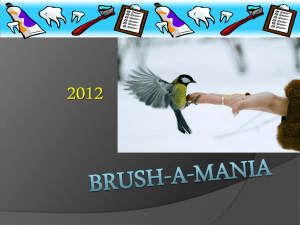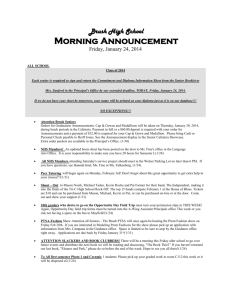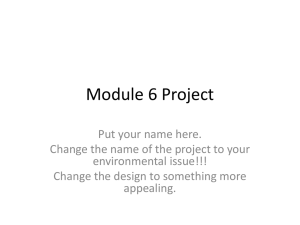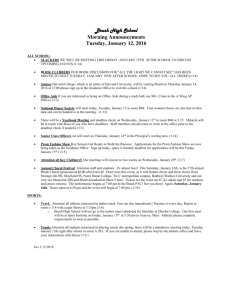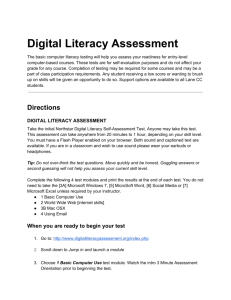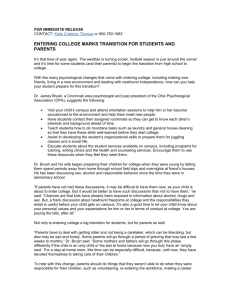DESIGN PROJECT I: Electric Toothbrush
advertisement
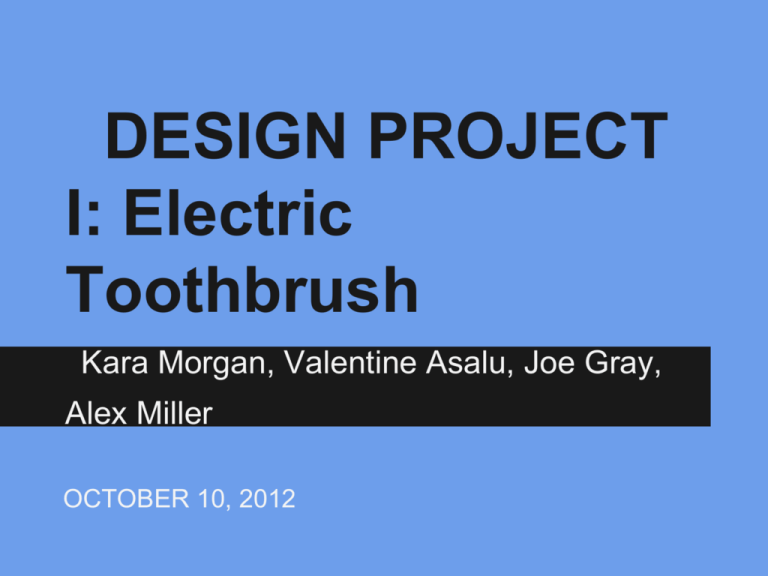
DESIGN PROJECT I: Electric Toothbrush Kara Morgan, Valentine Asalu, Joe Gray, Alex Miller OCTOBER 10, 2012 Concept Generation • • 1. 2. 3. 4. Customer Needs Assessment External Search Labs 1 & 2 Patent Search Product Archaeology Benchmarking Concept Generation (cont.) • • Morphological Charts Pugh Charts Project Management (collective) • • • • Customer Needs Assessment Labs 1 & 2 Concept Generation Concept Selection Product Management (specialized) Alex Product Archaeology Pugh Charts Kara Customer Needs Morphological Charts Valentine Product Benchmarking Problem Statement Joe Patent Search Solid Works Design Hierarchical Customer Needs Figure 1. AHP Pairwise Comparison Chart to Determine Weighting for Main Objective Categories Figure 2. AHP Pairwise Comparison Chart to Determine Weighting of Quality SubObjectives Revised Problem Statement After having assessed the niche “green” market, the design team has identified the key consumer demands to be included in the final concepts of the electric toothbrush redesign. Ultimately, we will employ these demands in order to produce a final product that is more sustainable with regards to both customer satisfaction and environmental conscientiousness. In particular, based on the assessment of the market demands, the project will proceed with particular emphasis on the aspect of quality, namely effectiveness, the category and subcategory of which were proven to be the most critical features according to the consumers surveyed. Benchmarking/Patent Searches We based our searches on three criteria; Cleaning, Packaging, Aesthetics. We researched different companies to see what patents and designs they already had on the market. Benchmarking/Patent Searches: The Gillette Company US 7, 636, 977 B2 Jan. 26, 2010 US 3,220,543 Nov. 30, 1965 Benchmarking/Patent Searches: Colgate-Palmolive Company US D476, 157 S Jun. 24, 2003 US D475,529 S June 10, 2003 Benchmarking/Patent Searches: Phillips Company US 6,463,615 B1 Oct. 15, 2002 5, 836, 030 Nov. 17, 1998 Brush Head Design Concepts Human Factors Body Design Human Factors Body Design Power Generation and Power Accessories Power Generation and Power Accessories Energy Mechanism for Brush Head Energy Mechanism for Brush Head Concept 1: Has jet stream of water to wet the toothpaste. None of the bristles rotate Concept 2: One of the bristles rotate in a circular motion while the other set of bristles move in a lateral motion. Concept 3: The brush has toothpaste dispenser built into it. Previous Concepts Power Generation and Power Supplies Accepts energy Stores energy Chemical (battery) Top-loaded battery compartment Bottom-loaded battery compartment (with battery cap) Flip-open central battery compartment Electrical Rechargeable battery unit Wall outlet Previous Concepts Human Factors Body Design Body thickness Grip shape Grip location On/off mechanism Buttons Location Slim Smooth Front Switch One button Front Bulky Form-fitted Back Button Two buttons Back No buttons Side Side Previous Concepts Energy Mechanism for Brush Head (function) Brush head function Motion Rotation Rotational Rotational Full rotation Linear Linear Partial rotation No rotation Previous Concepts Brush Head Design Number of heads Shape combinations Orientation One head Circular Angled Two heads Rectangular Linear Three heads Circular and non-circular Circular and circular Circular and two rectangular Two circular and one rectangular Three circular Concept Selection 4 Factors - environmentally friendly - quality - convenience - comfort Body Design Pugh Chart Results Concept 4 Body Grip Grip Location # of Buttons Button Location Slim Form Fitted Front 2 Front Energy Mechanism Brush Head Pugh Chart Results Concept 1 Movement Defined Movement Rotational Full Rotational Power Generation Pugh Chart Results Concept 4 Type Type Detail Electrical Wall Outlet Brush Head Design Pugh Chart Results Concept 2 # of heads Head Type Angled? 2 Circular & noncircular Yes Final Design Power Generation • Electrical source (wall outlet) Brush Head Design • • • 2 Heads One round, one rectangular Slightly angled for effectiveness Power Accessories • Charging station Energy Mechanism for Brush Head • • One fully rotational head One linear head Human Factors Body Design • • • • Slim body Form fitted Front grip (frontal grooves) Two buttons on front Final Design (excluding bristles) Final Design 1. Angled toothbrush heads 2. Circular fully rotational head 3. Rectangular linear head 4. On button 5. Off button 6. Form fitted grips 7. Rechargeable location Final Design MultiView Final Design Dimensions Side View Front View Top View How Does it Work? Our finalized product is designed to eliminate the complications associated with electric toothbrushes. • • Activation begins after pressing the on button, and activity concludes either after 2 minutes or after the off button is pressed. Simultaneously, the brush heads work together in order to eliminate plaque from teeth. -One rotational and one linear moving head will ensure that tooth cavities will be penetrated and a necessary surface area can be covered. • -They are also set at a slight angle to increase penetration Power is generated from electrical power source. -Toothbrush charges while sitting upright in a charging station. Final remarks • Does final product address customer needs? o Comfort o Environmentally sound o Convenience o Quality Durable replacement parts Mechanically durable Lasting charge life Effectiveness
